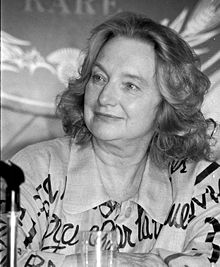- Christine Arnothy
-
Christine Arnothy (born 20 November 1930 in Budapest, Hungary) is a French writer. She has written numerous books, including J'ai quinze ans et je ne veux pas mourir (1955) ( I am Fifteen and I Do Not Want to Die'). It is a book following her life and escape from Budapest during the Second World War.
She left Hungary, crossing the border with her parents. On her arrival in France, she had only one thing: a journal of her life in Budapest.
Arnothy eventually married Claude Bellanger (1909–1978).
Her book J'ai quinze ans et je ne veux pas mourir was translated into English. I Am Fifteen and I Do Not Want to Die is a personal record of her experience as a teenager during the 1945 siege of Budapest. It was reviewed in Harper's Magazine in 1956.[1] Good reviews also from The Daily Express,[2]The New York Times,[3] Herald Tribune,[4] San Francisco Examiner,[5] Kirkus, L.A. Herald Express,[6] Chicago Sunday Tribune[7] and The Times[8] There's an ulterior sequel, It Is Not So Easy to Live (but this second part doesn't come from her journal but from her memory);where she chronicles her escape via Vienna to Paris,where she eventually settled and married.
She also wrote a couple of detective stories under the pseudonym William Dickinson and a lot of books. No one work has been so successful as J'ai quinze ans et je ne veux pas mourir, which has been considered by some authors (i.e.: Sándor Márai[9]) as a masterpiece of the literature about the Second World War.
References
- ^ http://www.harpers.org/archive/1956/08/0074039 Harpers Magazine
- ^ The Daily Express, 2-25-1956: "For this ugly story is made beautiful by Christine's love of life : her enjoyment of humanity. What a triumph to live through such horror and to make it a resounding success."
- ^ The New York Times, 6-10-1956:"This astonishing tale always rings true and it is not surprising that in the original French it won the Prix des Vérités. Christine Arnothy writes with compassion, economy and reticence."
- ^ Herald Tribune, 6-10-1956:"The juxtaposition of tender youth with war's brutality gives any book an irresistible poignance, and when the narrator has so marked a flair for writing as Christine Arnothy, the story can hardly fail to move."
- ^ San Francisco Examiner, 6-11-1956:"Seldom have horror and tenderness been more effectively juxtaposed."
- ^ L.A. Herald Express, 7-28-1956:"The effect of war's brutality on tender youth gives this book an especially irresistible poignance, coupled with the fine flair for writing by the author and central figure."
- ^ Chicago Sunday Tribune, 7-8-1956:"The incidents recorded by Miss Arnothy set the book apart from other such records. As in the diary of Anne Frank, such a story becomes more tender, yet richer, because of the point of view. (…) It is a book believable and intense, with a "you are there" quality that makes the ultimate fleeing from the city and then from the country a great relief."
- ^ The Times, 3-15-1956: If Miss Arnothy's account is credible, yet not intolerable, this is in part due to her instinctive skill as a writer, and in part to the sudden flashes of humanity which light up the terror."
- ^ Interview in San Francisco: <<It could have been my story. I don't know whether to feel happy or sad every time I read this compelling novel>>
Sources
Categories:- 1934 births
- 20th-century French writers
- Living people
- People from Budapest
- Prix Interallié winners
Wikimedia Foundation. 2010.

